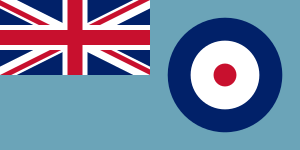No. 117 Squadron RAF
No. 117 Squadron RAF was a Royal Air Force Squadron formed to be a bomber unit in World War I and reformed as a transport and communications unit in World War II.
| No. 117 Squadron RAF | |
|---|---|
| Active | 1 Jan 1918 – 6 Oct 1919 30 Apr 1941 – 17 Dec 1945 |
| Country | |
| Branch | |
| Motto(s) | "It shall be done"[1] |
| Insignia | |
| Squadron Heraldry | A terrestrial globe |
| Squadron Codes | EX (Apr 1937 - Sep 1939) LD (Jul 1943 - Sep 1943) |
History
Formation and World War I
No. 117 Squadron Royal Flying Corps was formed as a bomber squadron on 31 January 1918 and was based at RAF Wyton where it was equipped with the DH9. The squadron became part of the Royal Air Force and was stationed in Ireland for a time before it was merged with No. 141 squadron on 6 October 1919.
Reformation in World War II
No. 117 reformed on 30 April 1941 at Khartoum, Sudan and incorporated the Khartoum Communications Flight which already had a captured Italian Caproni Ca.148 aircraft that had been impressed into service in 1940.[2] Needing a long range aircraft, four Bristol Bombays were borrowed from 216 Squadron and in May a flight of ex-Yugoslav Savoia-Marchetti S.79Ks were taken on charge.[2] When the squadron moved to Egypt in November 1941 to provide transport services, the communications aircraft were left in Khartoum and the Bombays were returned. From November 1941 the whole squadron was equipped with the Lockheed Hudson. In 1943 it was involved in Operation Husky as part of No. 216 Group RAF and switched to Dakotas based at RAF Castel Benito, Libya. In October 1943 the squadron moved to India and in 1944 it transported supplies for the Chindits who operated behind the Japanese lines.
Post War
The squadron was disbanded on 17 December 1945 shortly after the war with Japan ended.
Aircraft operated
Data from[3] unless otherwise specified
| From | To | Aircraft | Variant |
|---|---|---|---|
| Oct 1918 | Oct 1919 | Airco DH.9 | [4] |
| Apr 1941 | Nov 1941 | Caproni Ca.148 | |
| Apr 1941 | Nov 1941 | Percival Proctor | I |
| Apr 1941 | Nov 1941 | Vickers Wellesley | I |
| Apr 1941 | Nov 1941 | Gloster Gladiator | I |
| Apr 1941 | Nov 1941 | Bristol Bombay | I |
| May 1941 | Nov 1941 | Savoia-Marchetti S.79 | K |
| Nov 1941 | May 1943 | Lockheed Hudson | [4] |
| Oct 1941 | Apr 1942 | Douglas DC-2 | K |
| Mar 1942 | May 1942 | D.H. 86 | B |
| May 1942 | Sep 1942 | Douglas DC-3 | |
| May 1942 | Sep 1942 | Lockheed Model 18 Lodestar | II |
| Jul 1942 | Sep 1943 | Lockheed Hudson | VI |
| Jun 1943 | Dec 1945 | Douglas Dakota | III |
| Jan 1945 | Dec 1945 | Douglas Dakota | IV |
| Jan 1945 | Dec 1945 | Stinson L-5 Sentinel | I |
References
- Pine, L.G. (1983). A dictionary of mottoes (1 ed.). London: Routledge & Kegan Paul. p. 116. ISBN 0-7100-9339-X.
- "RAF - Foreign Military Aircraft in WWII Service". www.raf.mod.uk. Archived from the original on 6 April 2015. Retrieved 3 April 2015.
- "No. 117 Squadron (RAF) during the Second World War". www.historyofwar.org.
- "RAF - 117 Squadron". www.raf.mod.uk.
External links
| Wikimedia Commons has media related to No. 117 Squadron RAF. |
